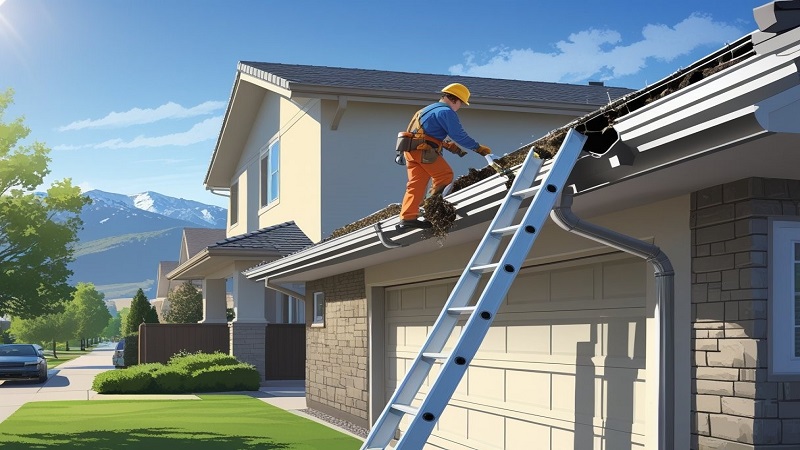Gutter maintenance often falls to the bottom of homeowners’ priority lists, yet neglecting this crucial aspect of home care can lead to significant problems. Denver’s unique climate, with its snow, hail, and occasional heavy rains, puts particular stress on gutter systems throughout the year.
Recognizing the early warning signs of gutter damage can save Denver homeowners thousands of dollars in potential structural repairs. These indicators include visible sagging, water marks beneath gutters, peeling paint, and foundation cracks that suggest water isn’t being properly directed away from the home.
Regular inspection becomes especially important during spring and fall in Denver, when seasonal changes create optimal conditions for gutter issues to develop. Professional gutter services in the area recommend examining your system after significant weather events to catch problems before they escalate.
How to Spot the Signs of Gutter Repair in Denver
Identifying gutter problems early can save Denver homeowners thousands in repair costs and prevent serious structural damage to their homes. Regular inspection of your gutter system is essential, especially after severe Colorado weather events.
Visible Leaks and Water Stains
Water stains on exterior walls or siding are typically the first indicators of gutter failure. Look for discoloration or water marks extending downward from the gutter line. These stains often appear brown or yellow against lighter siding.
In Denver’s climate, the freeze-thaw cycle can exacerbate small cracks in gutters, turning them into significant leaks. Examine your gutters during or immediately after rainfall to spot active leaks.
Pay particular attention to gutter seams and corners, as these are common failure points. Water damage may also appear on interior ceilings or walls, especially near the roof line.
Denver homes with older gutter systems are particularly susceptible to leakage problems. If you notice water collecting where it shouldn’t be during our spring rainstorms, prompt action is necessary.
Overflowing and Clogged Gutters
Gutters spilling water over their edges during rainfall is a clear sign of blockage. Denver’s numerous cottonwood, maple and ash trees create substantial debris that can quickly clog gutter systems.
Common causes of clogged gutters in Denver:
- Tree leaves and needles
- Cottonwood fluff (especially prevalent in early summer)
- Twigs and small branches
- Granules from asphalt shingles
- Bird nests and animal debris
Water cascading over gutter edges creates distinctive erosion patterns in landscaping below. Check for soil erosion or displaced mulch directly beneath overflowing sections.
After our winter seasons, inspect gutters for ice dam damage—a common issue in Colorado’s fluctuating temperatures. Professional cleaning twice yearly is recommended for most Denver homes to prevent overflow issues.
Sagging Gutters and Damaged Brackets
Properly functioning gutters should maintain a slight downward slope toward downspouts. Any visible sagging sections indicate structural problems requiring immediate attention.
Examine gutter brackets and fasteners for:
- Rust or corrosion
- Loose or missing screws
- Separation from fascia boards
- Bent or damaged sections
Denver’s heavy snow loads and occasional hailstorms place significant stress on gutter systems. Metal expansion and contraction from our temperature fluctuations can gradually loosen fasteners over time.
Measure the gutter slope using a level—aim for a quarter-inch drop for every 10 feet of gutter. Improper slope prevents efficient water flow and leads to standing water issues. Sagging sections generally indicate bracket failure needing professional repair.
Pooling Water and Foundation Concerns
Water collecting around your home’s foundation after rainfall suggests downspout or drainage issues. In Denver’s clay-rich soil, this presents significant foundation risks through hydrostatic pressure.
Look for wet basement walls, efflorescence (white mineral deposits), or musty odors in lower levels of your home. These symptoms often appear after heavy precipitation or snowmelt.
Monitor the ground around your foundation during rainfall. Properly functioning gutters should channel water at least 5-6 feet away from your home’s base through downspout extensions.
Denver’s semi-arid climate means soil expands dramatically when wet then contracts when dry. This cycle magnifies foundation damage from poor drainage. Consider that just one inch of rainfall on a typical roof produces hundreds of gallons of water that must be properly managed.
Repair Solutions and Preventive Care for Denver Gutters
When Denver gutters show signs of damage, prompt action can save homeowners from costly repairs down the road. Proper solutions range from professional services to material selection and preventive maintenance.
Professional Gutter Repair and Replacement
Finding a reputable gutter company in Denver is crucial for quality repairs. Professional gutter contractors possess specialized tools and experience to address issues ranging from minor leaks to complete system failures.
Many Denver gutter specialists offer free inspections and estimates, allowing homeowners to understand the scope of needed repairs before committing. These professionals can identify whether simple repairs will suffice or if full gutter replacement is necessary.
For homes with extensive damage, seamless gutter installation provides a durable, leak-resistant solution. Professional contractors can complete most residential gutter replacements in a single day, minimizing disruption to homeowners.
When selecting a contractor, look for companies with strong local references and experience handling Denver’s specific climate challenges. The best professionals will explain how proper gutter function protects against roof damage, foundation issues, and water intrusion.
Choosing the Right Materials and Gutter Types
Material selection significantly impacts gutter longevity in Denver’s variable climate. Seamless metal gutters, particularly aluminum and galvanized steel, offer excellent durability against Colorado’s freeze-thaw cycles and summer hailstorms.
Vinyl gutters provide a budget-friendly option but may become brittle in extreme cold. For homes in Denver’s upscale neighborhoods, copper gutters deliver unmatched elegance and exceptional lifespan, often lasting 50+ years with proper maintenance.
Gutter sizing matters as much as material. Standard 5-inch gutters work for most homes, but properties with steep roofs or high rainfall collection may require 6-inch systems with larger downspouts.
Sectional versus seamless is another important consideration. Seamless gutters reduce leak points and require less maintenance, making them increasingly popular for Denver homes despite slightly higher upfront costs.
Gutter Guard Installation and Maintenance
Gutter guards represent one of the most effective preventive investments for Denver homeowners. These protective systems prevent leaves, pine needles, and debris from entering gutters while allowing water to flow freely.
Several guard styles work well in Colorado’s environment. Mesh screens offer affordable protection, while more advanced micromesh systems provide nearly complete debris blocking. Foam inserts present another option, though they require replacement more frequently.
Professional installation ensures proper fit and function. Most gutter companies in Denver CO offer guard installation services, often with warranties against clogging.
Even with guards, seasonal maintenance remains important. Schedule professional cleanings at least annually, ideally in late fall after leaves have dropped. Regular maintenance helps identify potential issues with downspouts, fasteners, and seams before they cause water damage to roofing or foundations.
For comprehensive protection, combine gutter guards with seasonal inspections, especially after major storms when hail damage may compromise gutter integrity.






